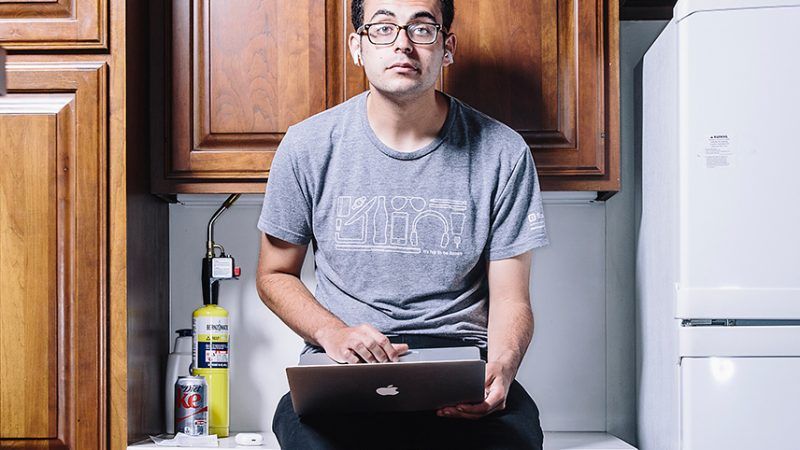Joshua Browder Is Building You a Robot Lawyer
The Stanford-trained wunderkind would like to see robot lawyers replace humans, doing all manner of legal work for (virtually) free.


Joshua Browder was drowning in parking fines when he realized the British government's labyrinthine appeals process could be navigated more quickly by software than by a person. As a teenager he built the DoNotPay app to do just that. But three years later, Browder has much bigger ambitions: He'd like to see robot lawyers replace humans, doing all manner of legal work for (virtually) free.
Now 21, the Stanford-trained wunderkind is developing artificial intelligence-driven algorithms to help American and British residents navigate the web of laws that can turn a small mistake, such as a traffic ticket accidentally left unpaid, into a bench warrant. And he's particularly interested in helping people make sense of the two countries' immigration systems.
"One of the biggest projects we have coming up is helping people who need to get their relatives into the United States legally," he says. "In the past we've also helped refugees claim asylum in the U.K., and also helped homeless people claim government housing. All of these processes are so bureaucratic that if you have no resources at all, it really is impossible to get the help you need."

In August, Browder spoke to Reason's Justin Monticello at his team's Palo Alto headquarters—the same house Mark Zuckerberg rented during his first summer there—about the project.
Q: When did you start coding?
A: When I was 12. I started by jailbreaking my phone to get custom app icons because I didn't like the ones that Apple used. It was a slippery slope from that.
Q: What were the origins of DoNotPay?
A: It all started when I turned 18 in the U.K. and got a huge number of parking tickets. I didn't have any money, so I trolled through all of these obscure government documents and began writing appeal letters. Then I realized, as a programmer, that this is the perfect job for software. Just three years later, over $16 million of parking tickets have been overturned using DoNotPay. This made me realize that a robot lawyer could help people in a lot of different areas.
Q: What happens when people actually get to court to contest these things?
A: At that point we actually give you a script, which you can read yourself. I think robots will eventually be allowed in court, but until that day comes, people can almost be a conduit for the robot. Lawyers like to make it seem like the law is rocket science, but in reality, it's just society's operating system.
Q: Are you worried that companies like LegalZoom may move into this space?
A: Those services help corporations primarily. For example, they can help people register a corporation. But what if your landlord steals your security deposit? In a lot of these cases, people don't even know that they do have some recourse.
Q: So people go to your website and they're asked questions about their situation? How do they figure that out?
A: For parking tickets, the application plays a game of 20 questions with you to figure out a legally sound defense. It will ask you if the parking bay was too small or whether the signs were hard to read. We're not expecting people to come in knowing what they can do—just that if they have an issue that bothers them, come to DoNotPay and we'll [try to] get you your money back.
Q: You're also not charging for your services, right? So how do you sustain yourself? How are you making money?
A: We're very lucky that we've raised a small amount of funding from top-tier venture capitalists who aren't focused on squeezing out short-term profits.
I think that if everyone in the world is one day using DoNotPay, we can maybe sell some other services. In the meantime, it's not like we have a hidden army of lawyers in the garage that we have to pay. Everything is fully automated and we're very cost-efficient.
Q: There are services now that allow you to automatically contest parking tickets, but they make money by taking a percentage of the money that they return to people. Why didn't you adopt that sort of model?
A: Fifty percent of injustice is still injustice, and by profiting off problems these companies actually have an incentive to perpetuate them. The biggest example is online tax filing services, which are now lobbying the government to keep tax filing complicated. DoNotPay doesn't have that conflict of interest.
This interview has been condensed and edited for style and clarity. For a video version, visit reason.com
This article originally appeared in print under the headline "Joshua Browder Is Building You a Robot Lawyer."
Editor's Note: As of February 29, 2024, commenting privileges on reason.com posts are limited to Reason Plus subscribers. Past commenters are grandfathered in for a temporary period. Subscribe here to preserve your ability to comment. Your Reason Plus subscription also gives you an ad-free version of reason.com, along with full access to the digital edition and archives of Reason magazine. We request that comments be civil and on-topic. We do not moderate or assume any responsibility for comments, which are owned by the readers who post them. Comments do not represent the views of reason.com or Reason Foundation. We reserve the right to delete any comment and ban commenters for any reason at any time. Comments may only be edited within 5 minutes of posting. Report abuses.
Please to post comments


First question I would have asked would be if the software has a program for defending yourself against a charge of practicing law without a license. He mentions tax accountants lobbying for keeping the tax laws complicated, the lawyers have the inside track and decades worth of time and money invested in keeping the law complicated and they guard their turf like a hungry pitbull on crack.
It ain't the accountants complicating tax law, it's politicians handing out patronage to donor and voter groups.
How do you know when the robot is lying? It's lips are moving.
I am interested to see how long this "AI the Lawyer" thing continues until the company realizes the same thing that LegalZoom realized- namely that lawyers are willing to pay big bucks for referrals. From that point on, the entire design strategy of LegalZoom was to capture information in order to route you to an unhelpful form that most people were unable to complete due to all the legalese, with a prominent "Get professional help" button placed for you to click.
I think the bulk of what patent and trademark attorneys are doing now will be software driven within 10 years; determinations are already so data driven and grunt work it outsourced to firms in India. Trial attorneys and litigators, more generally, would be more difficult to supplant, at least until our court systems become much more sophisticated.
An AI would have to be really powerful to understand the "logic" involved in many legal rules.
So Browder wants to avoid paying legitimate fines, make it easier for people to claim welfare benefits, and fill inboxes with endless computer-generated BS.
We like him why?
DoNotPay may not have that incentive, personally, but it encourages increased complexity just the same. The purpose of these laws is the revenue and control, and when people start getting around that with robot lawyers, the government's reaction will be to fine tune its bureaucracy to restore revenue and control. The end result will always be more complex laws.
If his idea doesn't work as well as he wanted in the real world, he can always turn it into a miniseries.
will it explode when it reaches the Commerce Clause?
Maybe hackers can reprogram it to send his asylum seeking relatives to Venezuela.
You have the right to remain silent. Anything you say can and will be used against you in a court of law. You have the right to speak to your phone, and to have your phone present during any questioning. If you cannot afford a phone, one will be provided for you at government expense.
"A: Fifty percent of injustice is still injustice, and by profiting off problems these companies actually have an incentive to perpetuate them. The biggest example is online tax filing services, which are now lobbying the government to keep tax filing complicated. DoNotPay doesn't have that conflict of interest."
It's a mistake to use these things.
It's free to file. If you want to refile after a year, you have to buy access.
Or maybe you print out a copy in case you have to refile?
Oh, by the way, why would you have to refile?
Robot lawyers - meh.
Now, robot JUDGES, there's an idea worth pursuing.
Better yet, robot juries.
I am interested to see how long this "AI the Lawyer" thing continues until the company realizes the same thing that LegalZoom realized- namely that lawyers are willing to pay big bucks for referrals. Anything you say can and will be used against you in a court of law. You have the right to speak to your phone, and to have your phone present during any questioning. connect with us to solve email problems via contacting our email support representative.
nice blog thanks. sohbet odalar? & sohbet siteleri